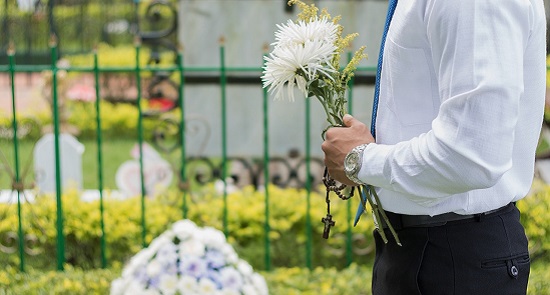A new mourning - Australians create new funeral rituals during pandemic
Media release
Australians are drawing on their ingenuity to create new funeral rituals in response to current COVID-19 social distancing measures.
Dr Philip Bachelor OAM, Lecturer in Cemetery Practice at Deakin University's School of Humanities and Social Sciences and a specialist in grief and bereavement, said Australia’s funeral industry is seeing novel and in some ways "exciting" innovations that may continue even if restrictions are eased.
"Necessity is the mother of invention and, with even our more sombre routines and ancient rites now being challenged, we’re seeing innovation and co-operation that is very positive for human progress," Dr Bachelor said.
Known in the bereavement industry as Australia's 'master of cemeteries,' Dr Bachelor is a social behaviourist specialising in bereavement-care, as well as a leading cemetery researcher, manager and educator. He is CEO of Box Hill Cemetery and a director of the Australian Centre for Grief and Bereavement.
"We keep hearing that our current situation in Australia is 'unprecedented,' but we may be overlooking quite recent history," Dr Bachelor said.
"Our parents, grandparents and great-grandparents mostly survived the Great War and deadly influenza pandemic, the Great Depression and then the Second World War. They were forced to conserve, innovate and co-operate to far greater degrees than we often recognise and while the impacts of past events were devastating for many, a stronger, more appreciative society emerged and paved the way for us.
"The most distressing event most of us ever experience is the death of someone we love, but a wonderful thing about humans is our amazing capacity for adaption. We're also ritualistic beings, commonly marking social transitions like birth, adulthood, marriage and death with rituals, through which we build social cohesion."
Dr Bachelor said the funeral industry was seeing many examples of innovation that included utilising available technologies and modifying traditional services.
"Many funeral services are now video-streamed, so those unable to be physically present can still follow proceedings from wherever they are. Live-streamed services can even include live text in various languages. Some funeral services are also being repeated, allowing greater numbers to be physically present at a service, though not all at once," Dr Bachelor said.
Other examples of creativity include funeral directors placing written messages from mourners on weighted-down balloons in the chapel during the service, so mourners feel they have a presence at the ceremony, turning the outside of a chapel into an outdoor theatre so people can listen to the service through their car radio, changing the procession route to drive past mourners’ homes and individuals creating private memorial services.
"Not everyone may be able to attend a funeral of their loved one, but how well we process grief is largely determined by our personal attitude," Dr Bachelor said. "It’s important to go easy on yourself. Grief is complex. Critical elements in how effectively we cope include our self-concept, personal beliefs and relationship with the deceased person.
"It’s particularly important to recognise that we all grieve differently. When a family member dies, we know they'd expect their intimates to grieve, but no one wants their loved ones to suffer any more than necessary. If we accept the social supports available to us, and share our thoughts and feelings with those who love and care for us, we can best mitigate the pain of our loss without fear that this might diminish our love or treasured memories."
The Australian Centre for Grief and Bereavement – a government-funded not-for-profit agency – offers bereavement counselling at no cost, tel: (03) 9265 2100, e-mail info@grief.org.au

